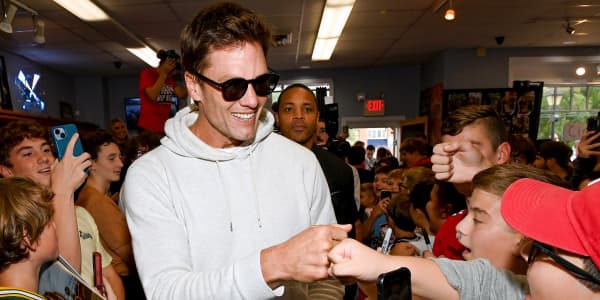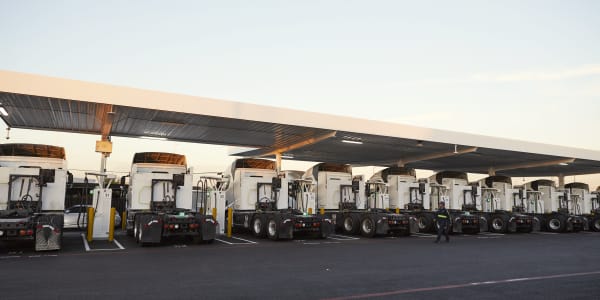Tech is rewiring social norms
The rise of apps—and our seemingly endless use of them—has changed how we interact with people and the world around us. In some cases, that's not a bad thing. Technology has improved and streamlined our day-to-day activities, disrupting the status quo and making things easier.
In other ways, it's not so great. While technology keeps us always "connected," living behind those small screens has also cut us off from one another in many ways. Further, many apps have turned us on to relying on the decisions of complete strangers to determine things like where to dine, whom to hire and where to lodge.
Here are 10 ways our behaviors have changed, for better or worse, and the apps that have impacted this transformation.
—Posted 16 August 2015
By Chris Morris, special to CNBC.com
Finding a date
Asking someone out in the real world has never been an especially fun process. Regardless of your confidence, you're putting yourself and your ego on the line every time. The object of your affection, often a stranger, could say yes, could politely decline or could reject you in devastating fashion.
The launch of services like Match.com and Tinder, though, took a degree of risk out of the situation. With a message or a swipe, you can seek companionship. And if they're not interested, the next potential partner is just a click away.
The obvious issue here is that just as some people are losing the ability to introduce themselves in person, they're also forgetting how to end relationships. The trend of "ghosting" is on the rise, with people making themselves disappear suddenly from the life of someone they're seeing, abruptly cutting off all contact with no warning, leaving the person they were seeing confused, hurt and often angry.
Navigating around town
While the New York City cab is still an iconic thing and San Francisco's BART is running strong, residents and visitors of both metropolitan areas (and many others) are increasingly bypassing these transit solutions to get from point A to point B. Services like Uber and Lyft offer an alternative for commuters, often at a significantly cheaper price.
Now, instead of standing on a rainy corner watching cab after cab pass you by or listening to a mumbled overhead announcement of train delays, services like these let you stay comfortable as you track your driver while he or she heads your way, with an ETA of when they'll pull up. There's no tipping to worry about. And more often than not, the cars you ride in are much cleaner than the alternative.
Discovering the news
Not too long ago, people could only find out what was happening in the world at specific times of the day. The advent of 24-hour cable news changed that, then online news services made it even easier to keep up.
Today a growing number of people find out about events through social media channels as friends, or even strangers, become town criers or on-the-scene reporters (often using tools like Periscope to show live video footage). Increasingly, big news events are being broken on sites like Facebook or Twitter, and people are turning to those sites to get up-to-the-minute information. The downside? That information isn't screened, so its accuracy isn't always on point.
Working out and staying fit
The basics of exercise aren't much different than they ever were. You run, bike, do yoga, etc. Where apps have changed exercise, though, is in providing increased motivation.
By crowdsourcing the activity that so many people hate, apps like Runkeeper make exercise a competitive event, pushing people to get off the couch or run a bit further so they can top their friends' achievements. Fitocracy, meanwhile, acts as a personal coach and helps people better track their exercise habits. And Stickk lets people put their money where their mouth is, requiring users to put up money to ensure they reach their goals.
Managing your pocketbook
Remember when it wasn't uncommon to know your local bank teller by name? Those days are quickly fading, thanks to the increased efficiency of apps from the banks themselves. Several banks, such as Bank of America and Chase, offer mobile check-deposit apps, allowing customers to bypass visits to the local branch when they need to deposit a check, simply by uploading a picture of their check through their smart device.
Apps like Mint, meanwhile, encourage people to keep a closer eye on finances and track day-to-day spending. It also provides alerts to let you know when a bill is coming so you can avoid late fees.
Bargain-hunting 2.0
The days of scouring through ads to find the best deal on everything— from televisions to tablecloths—are long over. Apps like RedLaser and Amazon.com let you scan the bar code of anything that catches your eye in the store.
The app quickly determines if the sale price is significant enough that you should buy now, head down the street to find an even better deal, or simply order online and wait a day or two to receive it.
Beating the market
Mirrored trading made its debut in the early 2000s, but it took a while to catch on. Today, Web apps at sites like Covester and Ditto Trade let you link your account to someone you believe has a good grasp on the market and replicate the trades they make at the same time they make them. Pick the right person and you could do well, but the practice has been criticized, as investors don't need to educate themselves as thoroughly as they may have previously.
The bigger question is: Are people even doing sufficient due diligence about the people they follow or just hoping to find an easier way to beat the market?
Finding helping hands
One of the problems with the mobile culture is people increasingly spending time with their nose in their phones, making them less likely to strike up conversations with neighbors or people other than their immediate group of friends.
So when they need help finding someone to repair the toilet or paint their house, they may not have a wide enough circle to find someone reputable. Enter services like TaskRabbit and Angie's List, which offer referrals for a wide range of workers, using crowdsourcing to help screen the companies. So rather than trusting friends, people are relying on the impressions of others they don't know—and will likely never meet.
Guiding stars for travelers
Ten years ago the thought of going to a strange city or country and staying at or with a complete stranger would have scared most rational travelers away. Today it's the hip thing to do. Rather than calling a generic hotel home base on their trip, an increasing number of people are opting to rent someone's apartment—or a room within—through services like Airbnb. It's one of the rare circumstances where apps are actually making people more social.
That socialization is also helping you avoid a ticket when you're on the road. Apps, such as Waze, alert drivers to obstructions, accidents and upcoming speed traps, letting you pick an alternate route—or hit the brakes before you're busted for speeding.
Dining and socializing with friends
The days of blindly trying a new restaurant are quickly drawing to a close. Before many people will commit to dinner at an unfamiliar eatery, they first consult an app like Yelp to weigh the opinions of previous diners. That might save them from a bad meal, but it's impossible to know that person's general tastes or if the facility was having an off night.
And after-dinner entertainment is often influenced by location check-in apps like FourSquare, because why go to a bar or club where you don't know anyone if there's one nearby where you can meet with friends?





